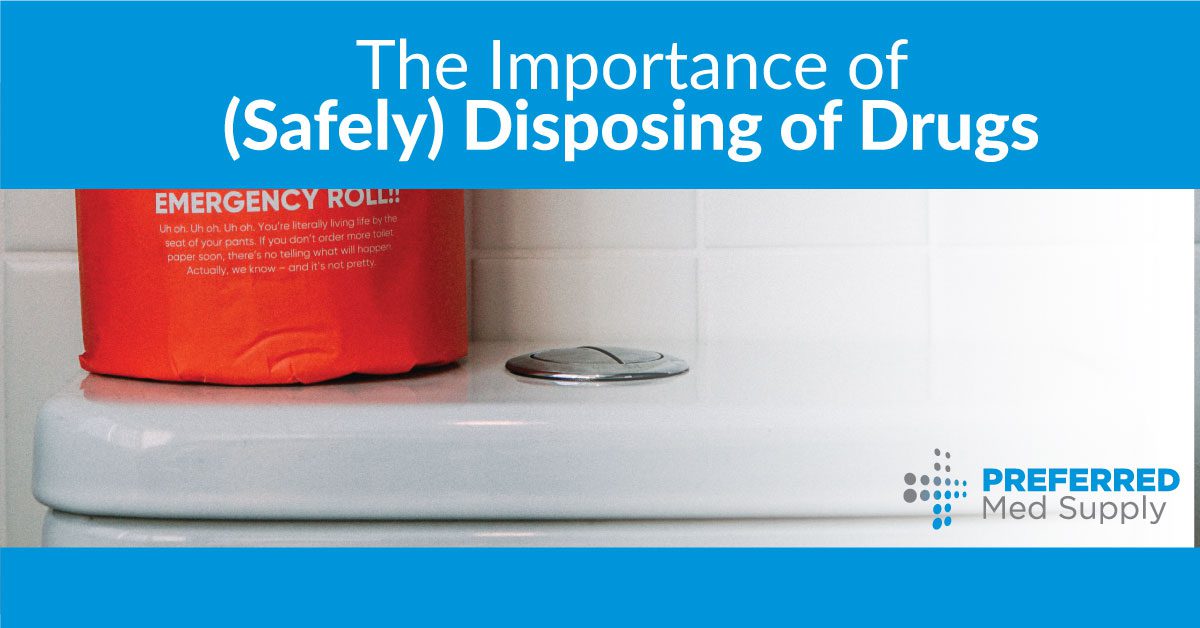There are several reasons why you would need to know how to safely and legally dispose of drugs, prescription or otherwise, in order to keep your family and yourself safe. Many people don’t know how to dispose of drugs, which can cause legal and safety issues for you, and for the environment if done incorrectly. Here, we’ll talk about why it’s so important to dispose of drugs through the proper channels, and how to ensure that drugs are handled responsibly.
If you find drugs in your home, there’s likely a bigger issue at play here. Make sure, that if you find illicit drugs or prescriptions that are unaccounted for, you ensure that the person/people in your home who may be using them get the help they need for what may be drug dependency or addiction.
Why Is It So Important to Dispose of Drugs?
There are two primary reasons why you should dispose of illicit and prescription drugs.
First, because there are links between teen drug use and availability of said substances. Teens who have easy access to drugs are more likely to develop a drug dependency, according to the Journal of Child and Adolescent Substance Abuse. What’s more, a study from the University of Michigan reported that 56 percent of parents kept their prescription pills at home, even after they no longer needed them. With what we know about addiction caused by opioid use, combined with the fact that opioids are the most heavily prescribed drugs for pain and chronic condition, this should be a statistic that alarms you.
Second, having drugs around your home is dangerous. With both illicit drugs and prescription drugs, unsecured substances can be accidentally ingested by young children or other family members, leading to hospitalization or death. According to LiveScience, thousands of children unknowingly take opioid drugs each year.
It’s clear that you should dispose of illicit drugs and prescription drugs after you no longer need them, but it’s important that you know how to dispose of them in a way that’s safe and responsible.
How to Dispose of Illicit Drugs
When it comes to drugs like heroin, cocaine, and other illicit “street” drugs, there is no simple answer when you need to know how to dispose of them. Let’s say you have a friend in rehab and they ask you to go to their apartment and dispose of their leftover stash, whether it’s cocaine, heroine, or any other illicit drug. You need to be legally protected as well as dispose of the drug in a way that doesn’t bring harm to you or anyone else.
First, never flush illicit drugs for any reason. Although there aren’t many resources that give information about drug disposal, flushing illicit substances will endanger wildlife and potentially even contaminate drinking water.
The best option would be to first check if your local office of law enforcement offers a “drug drop program”. We’ll speak more on programs like this when we discuss prescription drug disposal, but if your local law enforcement does have such a program, make sure that they accept illicit controlled substances with complete amnesty. Here is an example of information about such a program.
The problem here is that there’s no legal way to transport illegal substances, even if you’re taking them to a drop off program in good faith. If you got pulled over for any reason, you’d still be the one in possession of the drugs. Although there is no prescribed legal way to dispose of cocaine, heroine, illegal amphetamines and more (without the risk of transporting them), most people dispose of illicit drugs the same way they do prescription drugs.
- Mix the drugs with dirt, kitty litter, or any other substance that renders them unpalatable
- Bag them up in a secure, sealed plastic bag. (with illicit drugs, you probably want the bag to be opaque).
- Throw them in your household trash or a nearby dumpster
Be aware that the same steps do not apply to sharps like needles used to inject heroin. Your best option to dispose of used heroin needles is like any other needles: in an FDA-approved sharps container.
Disposing of Legal Drugs
Disposal of prescription drugs is a different matter. These drugs are legal to possess, as long as you’re the person who they were prescribed to. If you’re disposing of prescription drugs for another person, or you found unmarked drugs in your home, you should proceed with caution, and follow the protocols discussed for illegal drugs. Possession of these substances is still viewed as a criminal behavior.
If you have leftovers from a prescription, especially if these substances are Schedule IV or lower (meaning that they have a moderate or high potential to be abused) it’s extremely important that you responsibly dispose of drugs in order to not endanger your loved ones, housemates, and family members.
The best way to dispose of your legal prescriptions is through a drug take back program or pill drop-off location. Local sheriff’s departments and some Walgreens offer drug drop off locations. Here is the map for Palm Beach County, where New Light Medical is located, just as an example. If you live in south Florida, a simple google search for “drug drop off” and the name of your county will yield similar results.
In addition, the DEA holds a “National Take Back Day”, generally two times a year, in April, and then again in October. This involves a “no questions asked” ability to surrender any leftover prescription drugs as a way to keep these drugs from reaching the street.
Issues With Flushing Drugs
We touched on this briefly in the discussion about avoiding flushing illicit drugs at all costs. With prescription drugs, this is a different matter:
The FDA recommends certain active pharmaceutical ingredients (APIs) to be safe to flush down your toilet as a disposal method, and any drugs with these ingredients in them are generally regarded to be safe. We agree, but only as a last resort. The FDA’s recommendations rest on the assumption that flushing of these substances is very rare. If done frequently, even the “safe” APIs’ entrance into water supplies have the potential to harm wildlife and even contaminate drinking water.
The Bottom Line
It’s clear that if you need to dispose of drugs for any reason, there are different protocols depending on the circumstances. If you find drugs in your home, or asked to dispose of drugs owned by a friend, you are at legal risk and you need to ensure that you are able to dispose of them safely without putting yourself in danger. If the drugs are from leftover prescriptions that you were prescribed, follow local law enforcement’s instructions on dropping them off at a safe location, and try not to flush your drugs if at all possible.
As we mentioned before, finding drugs in your home is dangerous for more reasons than one. Disposing of the drugs likely won’t end the problem, because it’s probable that someone you know is struggling with substance dependency or addiction.

